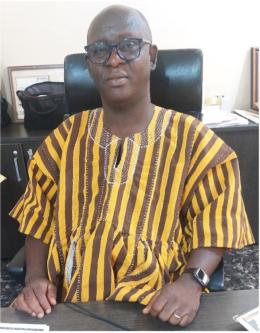
- onkufra@yahoo.co.uk
Dr. Francis Kusi is the Director and Principal Research Scientist (Host Plant Resistance Entomologist) at the Council for Scientific and Industrial Research - Savanna Agricultural Research Institute (CSIR-SARI).
As a Host Plant Resistance Scientist, his research interests are in screening of germplasm for sources of resistance to major insect pests and other biotic and abiotic constraints of the major crops of the dry savanna zone of Ghana. DNA markers are further screened to identify those that are tightly linked with the resistance gene(s) which are used in marker–assisted selection to improve the field resistance of susceptible farmer preferred crop varieties. Through the support of Kirkhouse Trust SCIO and Sub Awards from University of California, Riverside (UCR) he has over the years acquired skills and knowledge in molecular breeding as well as phenotyping for sources of resistance to major biotic and abiotic constraints of field crops.
Dr. Kusi, led a team of scientists to develop and release five Cowpea varieties resistant to aphids and striga in 2016, 5 Frafra potato varieties in 2018, two cowpea varieties in 2022, and five Frafra potato varieties in 2023. He achieved these through funding from Kirkhouse Trust, WAAPP 2A, a sub award from UC Riverside (Innovation Lab for Legume System Research, a UASAID sponsored Project) and WACCI University of Ghana. He jointly released seven Cowpea varieties with University of Cape Coast in 2018. He was adjudged as the National Best Agricultural Researcher in 2016 during the 32nd National Farmers Day celebration in Ghana.
Currently, he is the Principal Investigator in Ghana for the Feed the Future Innovation Lab for Legume Systems Research Project, “Development of Market-Driven Improved Cowpea Varieties for West Africa using Mature-Markers,” and the lead scientist of a sub award from University of Ghana under “Promotion of Food and Nutrition Security in the West African Sub-region through indigenous, neglected, and underutilized fruits and vegetables for the Horticulture Innovation Lab.
